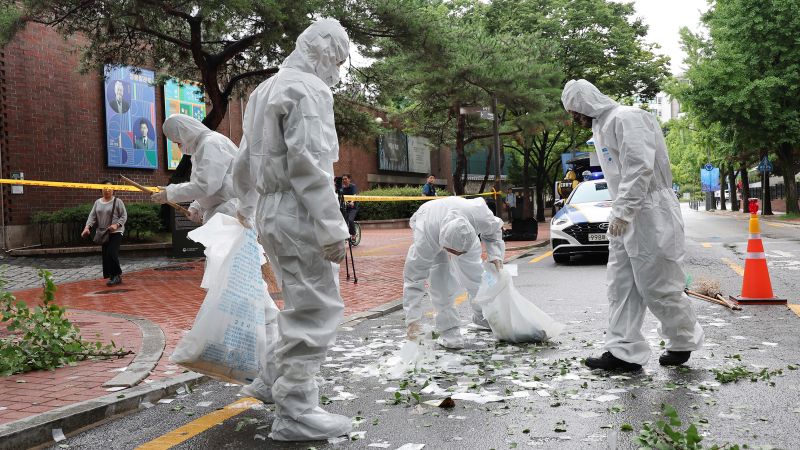Park Dong-ju/Yonhap News/AP
Police officers in protective gear remove trash from a balloon believed to have been launched from North Korea in Seoul, South Korea, on July 24, 2024.
Seoul, South Korea
CNN
—
A North Korean balloon loaded with garbage was found on the grounds of South Korea's presidential office, authorities said Wednesday, the latest in a series of incidents that have raised tensions and rhetoric on the Korean peninsula.
More than 3,000 North Korean balloons filled with garbage such as cigarette butts, discarded batteries and even fertilizer have fallen into South Korea since May, South Korean officials say, prompting authorities to respond by resuming loudspeaker broadcasts of propaganda, K-pop songs and other entertainment along the Demilitarized Zone (DMZ).
Wednesday's discovery at the Blue House came after South Korean authorities warned their citizens to be on the lookout for falling objects as an object believed to be a North Korean trash balloon traveled south toward northern Gyeonggi province.
“Today, in cooperation with the Joint Chiefs of Staff, we were monitoring trash balloons sent by North Korea and confirmed that debris had fallen in the area of the Blue House in Yongsan,” the Presidential Guard said in a later statement.
“Response team analysis found no hazardous or contaminant substances.”
South Korea's Joint Chiefs of Staff (JCS) has urged people not to touch any fallen balloons and to report any they come across to authorities.
“North Korea's actions are a clear violation of international law and seriously threaten the safety of our people,” the Joint Chiefs of Staff said in a statement after the recent balloon incident. “North Korea bears all responsibility arising from its balloons. We sternly warn North Korea to immediately cease its inhumane and low-level actions.”
North Korea has previously said it sent balloons to the South in response to a civilian campaign in South Korea to send balloons filled with anti-North Korean propaganda in the opposite direction.
South Korean activists and defectors have for years sent balloons to North Korea loaded with documents critical of dictator Kim Jong Un as well as USB sticks filled with K-pop songs and South Korean TV shows – all of which are strictly banned in the impoverished and deeply isolated country.
In a statement carried by North Korean state media earlier this month, Kim Yo Jong, the sister of North Korea's supreme leader, said dozens of balloons, “dirty leaflets” and other materials sent from South Korea had been found again inside North Korea and near the border.
Despite repeated warnings from North Korea, South Korean activists “have not stopped this crude and dirty act,” she said.
In a “stern warning” issued by North Korea's state-run Korean Central News Agency (KCNA), Kim Yo Jong said “a situation that cannot be overlooked appears to be approaching”, adding that there would be a “terribly high price” to pay that could change South Korea's “countermeasures” against the North.
As the balloons fly across the border, North Korea continues to criticize U.S. and South Korean military exercises on the Korean peninsula, the latest example being the deployment of U.S. Marine Corps F/A-18 and F-35B fighter jets to Suwon Air Base this week for joint air training.
South Korea's Defense Ministry said the U.S. aircraft would join South Korean F-15, F-16 and FA-50 fighter jets in the exercises, which run until Aug. 8.
A Pentagon statement said the Marine Corps jets were sent “to enhance the readiness and offensive capabilities of our allied and joint forces in the Republic of Korea.”
But an editorial in the Korean Central News Agency argued that the joint exercises were an example of Washington's “intensity in expanding the overall confrontational structure against North Korea.”
North and South Korea have been divided since 1953, when an armistice was signed three years after North Korea invaded South Korea, but no peace treaty has been signed and the two countries are technically still at war.

